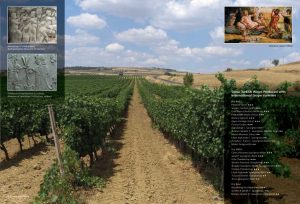A Food, Wine Tour & Wine History Walking Tour in Istanbul with a Researcher and Sommelier Guide
The lands that are now Turkey were the earliest to cultivate vineyards and produce wines, dating back to the Neolithic Age (Çayönü-Nevalı Çori, 7000 B.C.).
The Hittites, Bronze Age people, were the first to make laws and regulations about viticulture and wine making, thus establishing a true Empire of Wine on Anatolian lands.
Istanbul Wine Tour
Today Turkey is home to the largest of the temples dedicated to Dionysus, God of wine.
How about a day of tasting delicious Turkish wines ↗, paired with Turkish food, and learning about the 9000-year-old Anatolian wine culture? Food and wine archaeology has increasingly become an interesting field of study. We invite you to take part in these discoveries!
Highlights of Istanbul Wine Tour
-

Visit the Archaeological Museums of Istanbul and see wine related exhibits
- Receive detailed information on the history of wine, given by our researcher and sommelier guide
- Enjoy a wine tasting session with our wine expert during lunch, with wines produced from native grapes of Turkey
- Enjoy a delicious lunch consisting of specialty dishes from Turkish cuisine paired with Turkish wines
- Take a walking tour and continue your wine tasting in the Galata neighborhood.
What is Included in Istanbul Wine Tour?
- Services of researcher and sommelier guide
- Museum entrance fees
- Lunch
- Wine Tastings
What is Not Included in Istanbul Wine Tour?
- Transportation
- Personal expenses
- Gratuity to the guide (optional)
Meeting Place and Time for Istanbul Wine Tour?
- 10:00 a.m. at the entrance to the Archaeological Museums of Istanbul
Duration of the tour: 6-7 hours
Where will the tour end: Karaköy neighborhood
Price: $195.00 USD per person
Capacity: Minimum 2, maximum 6 guests
Terms & Conditions and Cancellation Policy
This tour is operated by A-group Travel Agency “Serif Yenen Travel” licensed by the Turkish Ministry of Tourism (License number: 8860)
What is wine
Wine is an alcoholic beverage made from fermented grapes or other fruits. The process of making wine involves converting the natural sugars present in the fruit into alcohol and carbon dioxide through the action of yeast. Grapes are the most common fruit used for winemaking due to their balanced sugar, acidity, and tannin levels, which contribute to the complexity and quality of the final product. However, other fruits like apples, cherries, and plums can also be used to produce fruit wines.
The general process of winemaking can be summarized in the following steps:
- Harvesting: The grapes or fruits are harvested from the vineyards or orchards when they reach the desired level of ripeness.
- Crushing: The harvested fruits are crushed to release their juice. For white wines, the skins are usually removed before fermentation, while for red wines, the skins are left in contact with the juice during fermentation to extract color, tannins, and flavor.
- Fermentation: Yeast is added to the juice to initiate fermentation, during which the yeast converts the sugars into alcohol and carbon dioxide. This step can take several days to weeks, depending on the type of wine being produced.
- Aging: After fermentation, the wine is typically aged in barrels or tanks to develop its flavor, aroma, and structure. Aging can take place for several months to several years, depending on the wine style.
- Bottling: Once the desired aging period is completed, the wine is bottled and may continue to evolve and improve with further aging in the bottle.
What is the characteristics of Turkish wines?
- Indigenous Grape Varieties: Turkey has a rich history of winemaking dating back thousands of years. It is home to many indigenous grape varieties, some of which are not found anywhere else in the world. These unique grapes contribute to the distinctiveness of Turkish wines.
- Diverse Terroir: Turkey’s diverse geography and climate provide a wide range of terroirs, which influence the character of the wines. Regions like Thrace, Aegean, Marmara, Central Anatolia, and Eastern Anatolia all have unique growing conditions that impact the grapes’ flavors and aromas.
- Aromatic Whites: Turkish white wines are often characterized by their aromatic qualities, with citrus, floral, and herbal notes. Grape varieties such as Narince, Emir, and Kalecik Karası are known for producing aromatic whites.
- Bold Reds: Turkish red wines are generally full-bodied and have a rich color. They often exhibit flavors of red and black fruits, spices, and a certain level of tannins. Grapes like Öküzgözü and Boğazkere are popular for producing bold red wines.
- Rosé Wines: Turkey is also known for its rosé wines, which are made from a variety of grapes and are appreciated for their refreshing and fruity character.
- Historical Influence: Turkish winemaking has been influenced by various civilizations throughout history, including the Hittites, Phrygians, Greeks, Romans, and Ottomans. This historical heritage can be seen in the traditional winemaking methods and grape varieties still in use today.
- Increasing Quality: Over the years, the Turkish wine industry has made significant strides in improving the quality of its wines. Modern winemaking techniques and investments in vineyard management have led to the production of higher-quality wines that can compete on the international stage.
Overall, Turkish wines offer a unique and diverse range of flavors and styles that reflect the country’s rich cultural heritage and terroir. In order to taste these unique flavors, you should definitely attend a wine tour organized by tasting experts.




